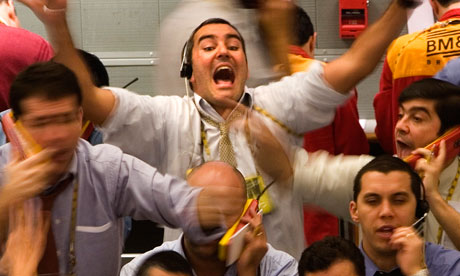
Obama getting asked-for advice, June 08,2012. Pete Souza/White House.
Obama is getting a lot of unasked-for advice at the moment from critics. After a period earlier in the year when he seemed to be on course for victory in November, he is stuck in the political doldrums again. His poll ratings are dipping, he's making gaffes, and - crucially - the economic recovery appears to have stalled. Meanwhile, Mitt Romney is raising money than expected.
One argument made by Obama's critics is that his campaign is making a mistake by demonising Romney as a ruthless, job-killing capitalist, based on his record as a businessman at Bain Capital. I agree. So does Bill Clinton (quote from Politico):
Clinton’s point is that Romney’s conservative policy vision should be a rich enough target without Obama having to sully himself through more personal attacks. “My instinct, you know me, I don’t think I should have to say bad things about Gov. Romney personally to disagree with him politically,” Clinton said in a recent CNN interview.
Clinton doesn’t say this just because he thinks civility is a good thing. He also believes that swing voters in particular hate what they see as mindless combat and will reward people they believe are dealing in good faith.
Former Pennsylvania Gov. Ed Rendell — a vocal critic of the Obama camp’s attacks on Romney’s business background — echoed Clinton’s argument in a recent interview. “Calling Romney a vampire [in a campaign ad about Bain Capital] was way over the top,” Rendell said.
But other Democrats — including influential voices in Obama’s camp — believe this approach is naïve. Republicans, in this view, have long prospered by being willing to play rough, and tear down opponents by any means possible.
The Democrats who say this want to sound all hard-nosed and unsentimental. In fact, I think they betray their own naivety.
It's a common mistake of those on the left to over-estimate the extent to which voters form their opinions about politicians on moral grounds - and to under-estimate the extent to which voters are drawn to perceived effectiveness. It's what Clinton was getting at when he famously remarked that, in politics, it's better to be "strong and wrong than weak and right". Whether consciously or subconsciously, voters want to feel, almost before anything else, that the people in charge are in control.
The problem with portraying your opponent as a ruthless bastard is that in hard times, many people think, "a ruthless bastard is exactly what we need right now." Voters may not warm to Romney - and most of them still like Obama personally - but if they perceive him to be amoral yet effective, they'll vote for him.
I think Obama would be better off portraying Romney as weak - as a flip-flopper who isn't up to taking tough decisions - in contrast to this president. In other words, a 2004 rerun, with Obama playing Bush.
In Britain, the choice for the Labour Party is similar. Miliband has to decide: is Cameron heartless or hapless, arrogant or weak? (He should remember that most people don't give politics enough brainspace to absorb both messages.)
Given the Coalition's record of U-turns and screw-ups the answer should be obvious. Call Cameron 'arrogant' and you risk making him look bigger, more confident and more in control than he actually is.
Yet Miliband is drawn to the 'arrogant/heartless' strategy because, like most Labour leaders, he instinctively believes that voters choose between politicians on moral grounds. Mostly, they vote on who can do the job.



